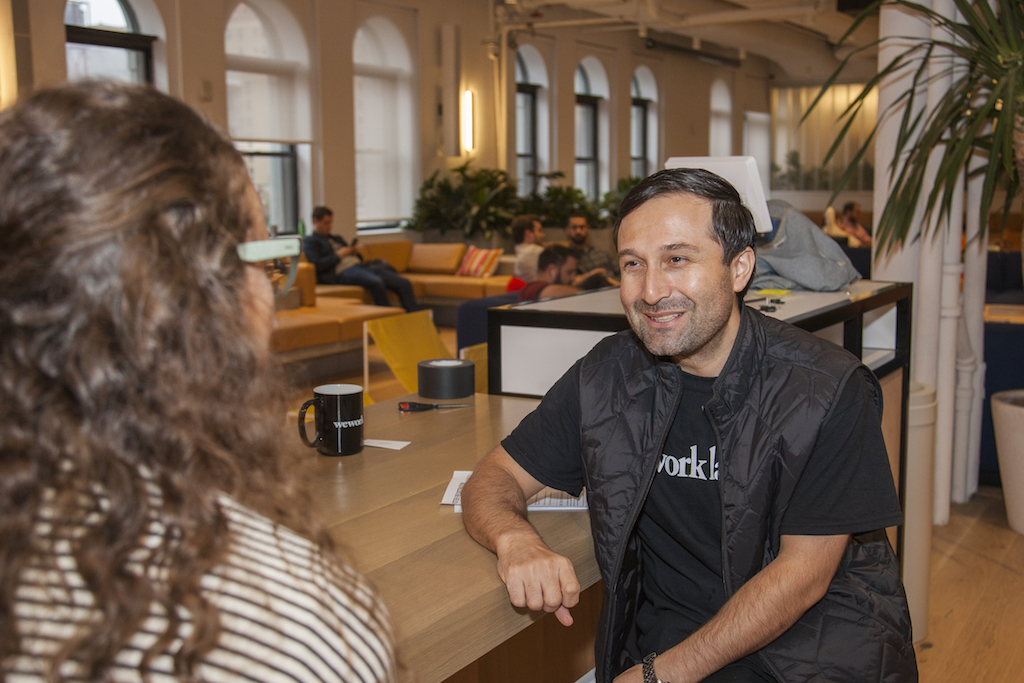Eqbal Anwari recently celebrated the one-year anniversary of what he calls “a milestone, a life-changing event.” It was the day when the native of Afghanistan—along with his wife and their two children—landed at New York’s JFK International Airport.
In Afghanistan, Anwari had worked for the United States Agency for International Development in a variety of roles, including as a language teacher, administrator, and human resource officer. His work in the war-torn country made him eligible for a Special Immigrant Visa, or SIV, issued to people who assisted the U.S. in Iraq and Afghanistan.
Hearing about colleagues applying for the program, Anwari couldn’t quite believe it was real. But soon he and his family were granted visas, along with enough money to furnish a new home in Brooklyn, pay rent for a few months, and buy all the basics that a family of four might need to begin a new life.
A few months later, when Anwari started a job at WeWork’s headquarters in Manhattan, he finally felt like he was on firm footing in his new country.

No One Left Behind––a nonprofit that specializes in providing people with SIVs with the support, opportunities, and connections they need to rebuild their lives––works to get jobs for people living in the U.S. under Special Immigrant Visas. It is partnering with WeWork to hire people like Anwari.
“Being in the WeWork environment will allow our heroes to be in an office of passionate professionals, many of whom are also business owners,” says Kristin Kennedy Brown, the organization’s director of strategic partnerships. “WeWork is also one of our only corporate hiring partners that offers starting employment with full-time hours and benefits, which is exactly what the families we work with need.”
Last year WeWork announced its commitment to hiring refugees fleeing regions touched by military conflict or natural disasters. It has pledged to hire 1,500 refugees over a five-year period.
Risking their lives to help the troops
Many people from Iraq and Afghanistan who worked for the U.S. put their lives on the line, which makes the SIV program even more important.
One of those people is Ajmal Faqiri, who grew up in Kabul. In 2006, when NATO and Taliban forces were battling, Faqiri—who speaks English, Pashto, Dari, and Urdu—began working for the U.S. military as an interpreter and cultural expert. Just 17 years old at the time, he served alongside American troops and high-ranking officials, including then-Secretary of Defense Robert Gates. Eventually, the Taliban targeted him, along with his wife and two children. Hoping to start a new life in America, he applied for SIVs for his family.
In 2013, the Faqiris finally arrived in San Francisco. With little support, they struggled until a fellow translator connected them to No One Left Behind. The organization was founded by an Afghan war veteran who fought for years to get his own translator an SIV.
Since it was founded five years ago, No One Left Behind has helped more than 5,000 translators get situated in the U.S. The organization estimates that 50,000 people are still eligible for the SIV program. And that number will increase, because the U.S. involvement in Afghanistan is ongoing.
Recently, No One Left Behind, along with Veterans for American Ideals and a number of other veterans rights organizations, called on Congress to allocate an additional 4,000 SIVs in 2019. So far Congress has not authorized the increase.
Negotiating a ‘new world’
After connecting with No One Left Behind, Faquiri and his family resettled in Arlington, Virginia. Faquiri has had difficulties making ends meet, but he now works as a real estate agent. He’s also been helping No One Left Behind resettle other families.
“A majority of the families, when they come to the country, they know nothing,” said Faquiri, now 32. “They’re like, ‘Wow, this is a separate world.’”
Every Saturday he rents a U-Haul to pick up furniture and items and delivers it to refugee families who are just starting out––part of No One Left Behind’s Operation Welcome Home initiative.
“I’ve probably furnished more than 200 families’ houses,” he said. “It’s incredible, man. It feels amazing. I will do this as long as I am alive.”
Anwari, now 34, is also doing well at WeWork.
“I am a community person who enjoys assisting the building operations team,” he says. “That’s what makes me happiest.”
He’s especially delighted to talk about his children’s progress. This year his daughter, Yasna, began kindergarten, from which his son Nima graduated last year. Watching Nima sing the American National Anthem was a “moment of pride” for Anwari.
“Every day my children go to school,” he said. “It feels very special when I see them studying in a safe environment.”




